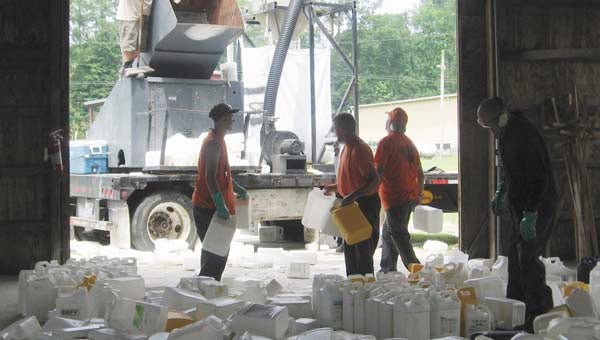Empty pesticide containers ground into new use
Published 10:40 am Wednesday, July 31, 2013

Southampton County Jail inmates on a work release program help throw empty and rinsed pesticide containers into a grinder at the fairgrounds. The granules will later be taken elsewhere for recycling into a number of new uses. — STEPHEN H. COWLES/TIDEWATER NEWS
COURTLAND—To help crops grow successfully, they need more than water and fertilizers. Micronutrients, such as boron and manganese, further aid growth. Fungicides, herbicides and insecticides guard against destructive forces. Unlike rain, of course, none of these come from the sky. Instead they’re packaged in large plastic containers ranging in size from 1 to 2.5-gallons.
Once empty, the jugs are potentially useful again. That’s where the free Southampton County Plastic Pesticide Recycling Program comes into action. This is a joint venture between the Virginia Department of Agriculture and Consumer Services and the Virginia Cooperative Extension Service, said Chris Drake, county extension agent.
“Recycling is an environmentally sound means of disposing of the hundreds of containers that each of our 120-plus farms use annually,” he said. “This saves landfill space, prevents outside burning of containers, which is illegal, and bodes well for public relations concerning agriculture.”
Area farmers can deposit their rinsed empties year round to a designated site, such as the fairgrounds, and these are torn into granules, Drake said. The grinding takes place in November and July, and most recently approximately 7,700 containers were recycled.
“In 2012, the Southampton County Plastic Pesticide Recycling Program had 29 participants from 22 farming operations that provided 11,950 pounds of granulated material, which equates to about 14,000 individual plastic pesticide containers,” said Drake.
He added that represents nearly 14 percent of the total for Virginia. Southampton County is the largest agricultural county in terms of row crop acreage in Virginia.
According to a brochure created by the state’s plastic pesticide container recycling program, the chips can made into new pesticide containers, agricultural drain pipes, speed bumps, parking stops, hazardous waste drums, scaffold nailing strips, commercial truck sub-floor support members, and dock and seawall pilings.
Drake added that lawn chairs are another option.
To assist him in last week’s granulating were Jeffrey Rogers, environmental program planner for the Office of Pesticide Services, and Robert Christian, a pesticide investigator for the VDACS. Supervised jail inmates on a work release program also pitched the containers into the grinder.
To learn more about the recycling program, contact Drake at 653-2572 or email chrisd17@vt.edu, or Rogers at 804-371-6561 or Jeffrey.Rogers@vdacs.virginia.gov.





